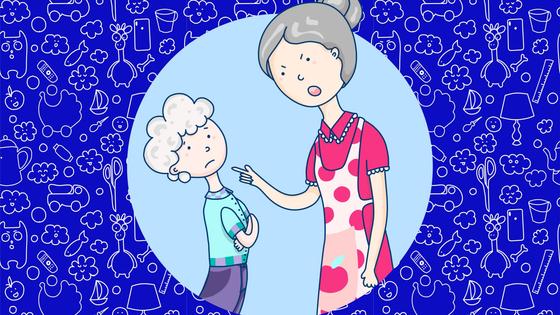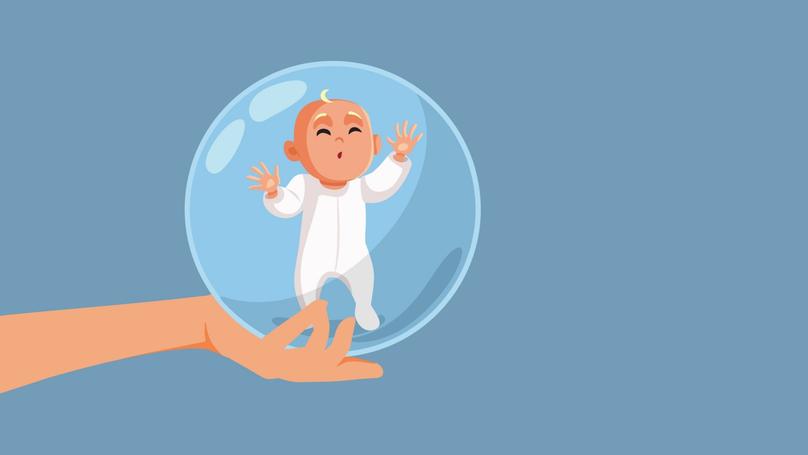What Hyper-Parenting is and How to Deal with It
Total control, apps to spy on children, and stereotyped phrases like "Make sure you wear a hat. Otherwise you'll catch a cold!" or "Call me when you arrive!" are all markers of unhealthy parent-child relationships, particularly overprotective.

Of course, you could object that there is no excess care. However, over-caring makes it toxic for your child. So, let's find out together what other signs distinguish overprotection, why it is dangerous, and how to treat it.
How Hyperbole Manifests Itself and What It Is Like

Hyper-protection or helicopter parenting is a type of relationship between children and their parents in which the latter exerts total control and excessive care. It is a particular style of relationship in the family when an authoritative adult, not necessarily a parent, shows excessive intrusiveness, restricts the child's freedom and choice, and deprives the child of the opportunity to show the slightest independence.
It is essential to realize that there is a thin and not always visible line between healthy care and hyper-parenting. It is because, during the first year of a baby's life, the parents maintain their baby's needs to satisfy them, as they cannot recognize and control them. However, as the child grows up and becomes aware of their needs, parents must allow them to act independently. Of course, the parent is always ready to help, but hopefully, the child learns to solve all needs, questions, and problems autonomously from the parent. It is the crucial difference between healthy parental care and hyper-parenting. However, if the parent is overprotective, they will continue to monitor the child's needs, controlling them and rushing to satisfy them as quickly as possible.
Psychologists point out that hyper-protection has three components:
-
Cognitive - the child is perceived by the parent as the only value;
-
Emotional - the parent is very close to the child on a sensual level;
-
Behavioural - the parent cannot simply watch the child grow up; they must participate actively in the child's life.
Excessive manifestation of one or another component indicates that the parent is a hyperprotector. However, there are also different types of hyperprotection.
-
Dominant
The most dominant type of hyperprotection manifests in the parent's desire to secure the child's every step and control all their actions. It also implies suppression of autonomy and the child's right to choose. In other words, a parent with dominant hyperpathy embodies an authoritarian style of upbringing, which means strict prohibitions and rules, unconditional obedience, and fulfillment of all orders of an authoritative adult.
-
Indulgent
This type of hyper-protection assumes satisfaction with the child's whims, admiration for all their actions, and shielding them from difficulties and household duties. In this case, parents want to protect their children from all manifestations of the outside world, perform all household chores, and even do their homework!
-
Demonstrative
Parents with a demonstrative type of hyperprotection strongly depend on the opinions of people around them. As a rule, the child of such parents is forced to attend dozens of developmental circles, contrary to their interests and desires. In this case, education aims to maintain the family's image and reputation in the eyes of others.
-
Inert
With this type of hyper-protection, parents purposefully and consciously seek to maintain the dependence of the child and the ability to control all their actions, suppress independence and initiative, self-assertion at their expense, and do not want to put up with the process of growing up.
But no matter what type of hyper-parenting does not suffer from parents, its signs remain similar for all varieties:
-
Total control - the desire to secure every step of the child and protect them from possible risks.
-
Suppression of initiative and independence.
-
Ignoring the child's interests, desires, and opinions.
-
Restriction of the circle of communication.
-
Constant evaluation and comparison of the child with other children.
Causes and Consequences of Over-Protection

Most parents unknowingly traumatize their children with excessive care and concern. The most common causes of such behavior psychologists call the following.
-
Obsessive fears cause an increased anxiety of the parent.
-
Compensation for their parents' mistakes, such as a lack of love and attention in the family.
-
Perfectionism and the desire to be an ideal parent.
-
Honours syndrome.
-
Fear of loneliness.
-
Compensation for failure in another area of endeavor, e.g., career.
-
Physiological instincts. These come most of all, mothers who have waited a long time for their child to go into the world, suffered complications during pregnancy or difficult childbirth, and become hyper-parents due to physiological reasons.
However, whatever the motives of parents who show hyper-protection, it inhibits the children's development with the constant anxiety and anxiety of the adult transmitted to the child. Other consequences of hyper-parenting for children include:
-
Selfishness and infantilization.
-
Insecurity.
-
Fear of making mistakes and failing.
-
A lack of personal boundaries.
-
An inability to take responsibility and make decisions.
-
Inflated self-esteem.
-
A lack of critical thinking.
-
Dependence on other people's opinions, and so on.
Depending on the hyper-parenting the child's parents suffered, the effects may vary, appearing stronger or weaker. For example, a child who grows up in a dominant environment hyper-protection will be more characterized by traits such as an inability to take responsibility and make decisions because their parents always did it for them.
However, fewer children suffer from over-protection from their parents themselves. They are characterized by:
-
Irritability and restlessness.
-
Conflict.
-
Increased anxiety and fear.
-
Dependence on the approval of others.
How to Stop Being Overprotective

If you have noticed signs of overprotective behavior and excessive care, it is worth reconsidering the communication style in your family, especially the child-parent relationship. First, it is vital to recognize the problem of hyper-parenting and then understand the reasons for your worries and concerns to determine if they are justified and adequate to the situation. Of course, the best way to help you in this course of psychotherapy is in the process of which you will be able to cope with the accumulated problems and not project them onto your child. Nevertheless, you can begin to fight hyper-protection symptoms on your own. To do this, use a few tips:
Tip 1: Take an interest in your child's opinions and give them a choice. Just for a moment, think about what could happen if your child decides independently. Believe me, the Earth will not fly out of orbit with the sun, and no catastrophe will occur. Of course, it is initially challenging to accept it, but start with the simplest things. For example, let your child choose the color of a T-shirt or the taste of juice without the advice of a parent. Try to control yourself and refrain from saying, "I know better what you need."
Tip 2. Don't do for your child what they can do for themselves. Allow them to show their independence; if anything happens, be ready to rescue them. At the same time, emphasize to the child that the responsibility for this or that decision lies with him.
Tip 3. Stop doing homework together with your child, and even more so, stop doing it for them. Everything that concerns the child's education should be in his area of responsibility. Only in this way will he learn independence, competent time allocation, and the ability to take responsibility for the grades received at school.
Tip 4. Do not rush to criticize in case of failure, blunder, or wrong choice. Explain to the child why he was wrong and how to correct the situation. But never use phrases like "I told you so."
Tip 5. Don't invade your child's personal space, and set clear boundaries. If you can't give up complete control over your children, try to do it unobtrusively and without pressure. It is best to set specific rules, such as not entering your child's room without knocking. Allow them to be alone and not try to follow their every move.
Tip 6. Remember yourself. Your child's needs are essential, of course. But no less important than yours. Learn to live your life, find new interests and hobbies, and shift your attention from your favorite child to other things that matter to you. Do not worry about showing a little less care than usual. It is called healthy selfishness.
Lectera’s Online Courses by topic
Tip 7. But don't overestimate yourself. Understand that if your child is the whole world to you, it may not be the same for them. In addition to you, their education is engaged in school. They communicate with peers and other authoritative adults about their hobbies and interests. You should be there and provide as much help as possible, but do not convince the child by force of your importance and expect an enthusiastic reaction from them.
Tip 8. Permit yourself to be wrong. Hyper-parenting is an aspiration to be the perfect parent. However, it doesn't work out that way in the real world. Remember that you are also a person; sometimes, you can distract yourself from household duties and get a little lazy while the child puts on tights inside out, confuses the right and left shoe, and eats too many chocolates.
Tip 9. Read the relevant literature and try to understand yourself. If you find it challenging to give up total control and give freedom to the child, perhaps you still have not understood the reasons for this behavior and your psychological problems. Take advantage of the literature that will help you to be more aware of the reasons for your child's behavior. For example:
-
Julie Lythcott-Hames' book "How to Raise an Adult: Break Free of the Overparenting Trap and Prepare Your Kid for Success" tells you about the three styles of hyper-parenting, how to overcome them and allow your child to grow into an independent, self-confident, and truly mature adult.
-
A voluminous scientific work, "The Self-Driven Child: The Science and Sense of Giving Your Kids More Control Over Their Lives," by neuropsychologist William Stixrud and educator Ned Johnson, about the stages of formation of the nervous system of the child and the importance of allowing children from an early age to make decisions on their own;
-
The book "Children Are from Heaven: Positive Parenting Skills" by John Gray on how to develop self-confidence in a child.
-
Madeleine Levine's book "The Most Valuable Thing: What is Really Important to Teach a Child so that He Grows Up Successful and Happy" explains what is important to teach a child to grow up successful and happy.
These tips will help you gradually eliminate the most obvious signs of hyper-parenting, let go of the situation, and give your child more autonomy. However, to get to the root cause of your hyper-parenting behavior, it is worth seeking professional help. The most important thing you can do is recognize the problem and decide to change the situation for the benefit of your offspring.
Share this with your friends via:
Latest News

In the UK, £23 million has been allocated for the expansion of the EdTech Testbed program — pilots of educational technologies in schools and colleges.

In the US, Tuskegee University announced the launch of Tuskegee University Global Campus (TUGC) — a new online platform for distance learning.

A significant stage in the development of the alternative education system has begun in West Northamptonshire in the UK: the County Council is actively calling on parents, guardians, and trustees to participate in shaping the future of this key area.

Outwoods Primary School in Atherstone, Warwickshire, having experienced deep sadness after the loss of their famous cat, Silla, has found solace in a new pet – a Maine Coon named Aloysius O’Hara.

In modern universities, artificial intelligence, and in particular ChatGPT, is rapidly transforming from a controversial tool into a full-fledged student assistant.












 £23 million allocated for the expansion of EdTech Testbed in the UK
£23 million allocated for the expansion of EdTech Testbed in the UK
 Tuskegee University launches Global Campus — a new online platform
Tuskegee University launches Global Campus — a new online platform
 Test: How Psychologically Mature Are You? Check Your Inner Foundation.
Test: How Psychologically Mature Are You? Check Your Inner Foundation.
 Test. Check Your Social Media Dependency Level!
Test. Check Your Social Media Dependency Level!
 Test: What Business is Right For You?
Test: What Business is Right For You?
 Test: How Prone Are You to Abusive Behavior as a Manager?
Test: How Prone Are You to Abusive Behavior as a Manager?
